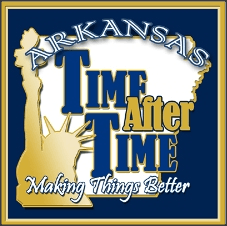Arkansas Time After Time
Arkansas Time After Time (ATAT) is a Conway, Arkansas-based non-profit, all-volunteer civil rights and justice reform organization. It is funded by its members. It is a grassroots legislative advocacy group dedicated to making communities safer and upholding constitutional rights of those labelled sex offenders by advocating for fact-based, common-sense laws. ATAT is part of the growing movement to reform sex offender laws in the United States. The mission of this organization is to develop a cooperative sense of community rather than take an adversarial approach between people on the sex offender registry, victim's advocacy groups and the authorities in the state. Arkansas Time After Time is state affiliate of National RSOL, and one of the more than 50 organizations seeking to reform sex offender registration-related laws in US. Their name is reference to time those labelled as sex offenders have to serve under public registries and constantly changing requirements after serving their court imposed sentences.[1]
| This article is part of a series on the |
| Sex offender registries in the United States |
|---|
 |
|
Legislation
|
|
Constitutionality |
|
Social issues
|
 | |
| Type | Non-profit organization |
|---|---|
| Purpose | Civil rights advocacy, Reforming sex offender laws |
| Headquarters | Russellville, Arkansas |
| Website | arkansastimeaftertime.org |
Purpose
Arkansas Time After Time aims to educate law-makers and public that sex offenders are diverse group of individuals; that contrary to popular belief, general recidivism rate of 5% over 5 years[2] is the second lowest of all offender groups;[3] and that residency restrictions and public notification have no demonstrable effect on recidivism and might actually undermine public safety,[4][5] thus making onerous restrictions and stigmatizing effect of public sex offender lists unfair and unfounded when applied broadly to all offenders without considering the individual risk and underlying facts of individual cases.
Arkansas Time After Time's goal is to help make communities safer and to protect children. In order to do this, it aims to educate the public and legislators to differentiate between those truly dangerous repeat violent sexual predators and those who at some time in their past committed a sex-related offense, served their sentence, completed or are currently undergoing treatment, and are working to re-integrate into society. ATAT holds that public registries have gone far beyond their original intent of protecting children and tracking violent sexual predators. It lobbies for fact based sex offender registry and policies to take account these differences instead of emotion based policies that may do more harm than good,[6] and seeks to educate law-makers and the public of the stigma and other adverse effects some registrants and their families are unnecessarily experiencing due to current blanket policies.[1][7] ATAT holds that current public registries are not effective and put registrants and their families in danger of vigilante attacks.
Advocacy
Arkansas Time After Time hosts a weekly radio show called "It Could Be You" on KABF 88.3fm.[8] In 2013, the group testified against Senate Bill 12 aimed to restrict where some sex offenders are allowed to go, saying it would punish the children and other family members of the registrants.[9][10] In February 2015, ATAT demanded local authorities to stop disclosing full addresses of registrants, when Arkansas law allows disclosing only block numbers. As a result of this campaign 17 of 24 local sheriff offices removed the full addresses from their web sites.[11]
See also
- Reform Sex Offender Laws, Inc.
- Florida Action Committee
- Advocates For Change
- California Reform Sex Offender Laws
- USA FAIR, Inc.
- Illinois Voices for Reform
- Michigan Citizens for Justice
- Women Against Registry - W.A.R
References
- "About Arkansas Time After Time". Arkansas Time After Time.
- Zgoba, Kristen; Miner, Michael; Knight, Raymond; Letourneau, Elizabeth; Levenson, Jill; Thorton, David. "A Multi - State Recidivism Study Using Static - 99R and Static - 2002 Risk Scores and Tier Guidelines from the Adam Walsh Act" (PDF). National Institute of Justice.
- Langan, Patrick A.; Schmitt, Erica L.; Durose, Matthew R. (2003). "Recidivism of Sex Offenders Released from Prison in 1994" (PDF). U.S. Department of Justice.
- "Sex Offender Registration and Notification". Sex Offender Management Assessment and Planning Initiative. Office of Justice Programs.
- "Breaking the cycle: Putting parolees to work". The Municipal. 16 August 2012.
- "Sympathy for the devil Police and other experts say some of our laws on sex offenders may be doing more harm than good". Arkansas Times. 25 January 2012. pp. 1–2.
- "Group opposes sex offender laws". The Baxter Bulletin. 16 February 2013. Archived from the original on 4 April 2015.
- "Radio". Arkansas Time After Time.
- "AR lawmakers tighten restrictions on sex offenders". KATV 7. ABC. 7 February 2013.
- "Senate OKs spending bill; sex offender bills advance". Arkansas Matters. 23 January 2013.
- "Sex Offender Registry: Address Debate". Arkansas Matters. 11 February 2015.